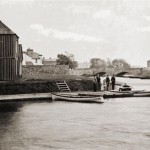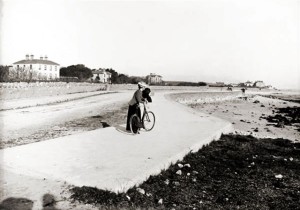Old Galway
WHERE THERE’S A WILL, THERE’S A WAY (06 06 13)

Now that the Leaving Certificate Exams are about to start and the rowing season is in full swing, we thought to share the following story.
St. Joseph’s secondary school rowing club first competed in 1932 when they beat St. Patrick’s in the schoolboy fours. They soon became a force in rowing but in the early 1950’s, the club was at a low ebb. They had no clubhouse, no equipment and no coach.A few of the boys who were not involved in any other sport got together and decided to start a crew.
IN THEIR GREEN AND BLACK JERSEYS (30 05 13)

Victory in the 1961 County Juvenile Hurling Final for the Father Tom Burke’s Team from the Claddagh in the same colours their grandfathers wore in the great days of hurling in South Park recalled memories of the Moores, the Macs, the Currans and the Carricks.Many of these names were represented in the 1961 team who defeated Mullagh in the final by a score of 5 – 8 to 3 – 3. Mullagh started with the wind and the rain at their backs and led by 2 – 2 to 1 – 3 at half time. They scored another goal immediately after the restart and this shocked the Claddagh boys into action who quickly retaliated with goals by Gerry O’Grady and Lorcan O’Rourke. The writing was on the wall.
CALLING CASTLEGAR PEOPLE (23 05 13)

A report from the Educational Commission in Ireland in 1826 lists two hedge schools in the parish of Castlegar. The first of these was at Merlin Park, built by the landlord Mr. Blake. The forty boys and twenty girls who attended got free tuition. The second school was at Ballygurrane, a few hundred yards north of where Scoil Colmcille Naofa stands today. It was a thatched house which doubled as a church on Sundays. Each pupil paid one shilling and eight pence per quarter. There were thirty boys and fifteen girls on the rolls. The thatched house was accidentally burnt down in 1827, and the school transferred to a stable in the village of Castlegar.
THE ROYAL GALWAY YACHT CLUB (16 05 13)

The first rowing club to be set up on the river was Corrib Rowing and Yachting Club and shortly afterwards, the Commercial Club was founded. The inauguration of yet another club in 1882, The Royal Galway Yacht Club, provided further competition in rowing and yachting. It contributed to regattas locally by fielding crews, being included on committees and other rowing activities, and it seems to have had a very strong yachting section.It was situated on the corner of the Gaol River as you can see from our photograph which dates from c.1890 and was given to us by the National Library. The club was so titled in accordance with a Royal warrant granted in 1882 and a letter from the Secretary of State in 1885.
THE MAY PROCESSION (09 05 13)

THE KNIGHTS OF MALTA IN GALWAY (02 05 13)

The first unit of the Order of Malta in Galway began in 1937 when Dr. Conor O’Malley was asked by the Marquis McSweeney, the then Chancellor of the Irish Association, to recruit members to form an Ambulance Corps aimed initially at Connacht only.In October of that year, Harry Warner asked the 5th year boys in the Bish if any of them were interested in joining a first aid class that Professor O’Malley was organising --- weekly lectures at the Central Hospital starting at 8pm.Only six places were available. All of the class were interested so six names were drawn out of a hat. They became known as ‘the schoolboys’.
Kevin Faller, Galway Poet (25 04 13)

Kevin Faller was born in the Crescent in 1920. His father was John Patrick Faller and his mother was Madeleine Quinn from Tuam. They both died within six months of each other when Kevin was very young, so he and his brother Liam were brought up by their grandfather Stephen Faller. Kevin’s Aunt Minnie, who was married to Nicholas O’Halloran, also helped to rear him.He grew up in Devon Park, and he used to play in Boland’s Wood and O’Hara’s Wood and in the general Devon Park/Taylors Hill area. He was educated in the Jes where he became very involved in rowing and coxed a number of successful crews.
Walking the Prom (18 04 13)

Towards the end of the 19th century, tourism interests in Galway used to advertise the Promenade as a place unrivalled in the country, where one could take the healthy invigorating salt air like nowhere else. In those times, it was just a narrow crooked roadway, very rough and untarred and the footpath seemed to extend from Palmer’s Rock to roughly opposite the entrance to Rockbarton, if one is to judge from how it finishes in the foreground of our photograph, which was taken c.1890. The road was known as the Lower Sea Road. The houses in the background are Belmore, owned by McDonoughs; Brinkwater owned by Maurice De Courcey Dodd; Maretimo owned by the O’Beirne family.
.png)